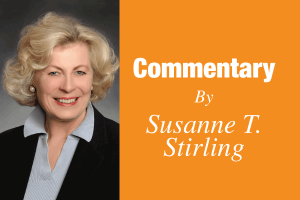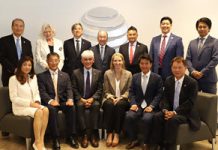 A busy, weeklong and successful series of events from the Asia-Pacific Economic Cooperation (APEC) summit is concluding today.
A busy, weeklong and successful series of events from the Asia-Pacific Economic Cooperation (APEC) summit is concluding today.
California Governor, Lt. Governor Play Key Role
The California delegation at APEC was led by Governor Gavin Newsom and Lieutenant Governor Eleni Kounalakis.
Governor Gavin Newsom provided important leadership during APEC as he and First Partner Jennifer Siebel Newsom met with world leaders to promote economic development and trade, as well as advance climate action and strengthen ties between California and the broader Asia-Pacific region.
On Wednesday, the Governor addressed the APEC CEO Summit—one of the most influential gatherings of business and government leaders from the Asia-Pacific region. At a fireside chat entitled, “Leading with Vision: How APEC Government, Local and Business Leaders Can Drive the Change We Need,” the Governor shared how California has turned the challenges of the climate crisis into opportunities that have helped grow our economy and create good paying jobs.
During the week, Governor Newsom met with leaders from Australia, Canada, Singapore, the United Kingdom and Vietnam. Highlights of those meetings included:
- Australia: Governor Newsom and First Partner Siebel Newsom met with Australian Prime Minister Anthony Albanese and The Honorable Dr. Kevin Rudd AC, Australia’s Ambassador to the United States. The Governor and the Australian delegation adopted a work plan for the Memorandum of Understanding (MOU) signed by California and Australia earlier this year and discussed priorities for year one of the partnership and ways to keep the momentum going on climate action and collaboration.
- Canada: The Governor and First Partner caught up with Canadian Prime Minister Justin Trudeau to talk about progress made on the climate partnership California and Canada launched last year. Specifically, the Governor and Prime Minister discussed implementation of the 2022 climate Memorandum of Cooperation (MOC), which has focused on several priority areas: ZEVs, methane, carbon capture, wildfire and forest resilience, and green shipping and aviation. They also discussed California and Canada’s strong economic and trade relationship.
- Singapore: Governor Newsom and the California delegation participated in a bilateral meeting with Singapore Prime Minister Lee Hsien Loong. The meeting centered on advancing bilateral relations, including on trade, economic development, and climate cooperation.
- United Kingdom: Governor Newsom and First Partner Siebel Newsom met with UK’s Secretary of State for Business and Trade Kemi Badenoch. The two discussed climate cooperation, the UK-California trade relationship and economic cooperation, and artificial intelligence.
- Vietnam: The Governor participated in a bilateral meeting with the Vietnamese President Vo Van Thuong. The California and Vietnam delegations worked to advance bilateral relations and strengthen cultural ties.
Also this week at APEC, the Newsom Administration, foreign dignitaries and leaders of major seaports advanced the state’s commitment to zero-emission port and shipping activities and developing additional partnerships along vital trade corridors that power the global economy.
Lieutenant Governor Eleni Kounalakis also played a key role at APEC, kicking off the first day of events and participating in 17 events and five bilateral meetings with top foreign government representatives. In addition, in her role as Finance Chair of the San Francisco Host Committee, Kounalakis spearhead the raising of $20 million for the city to host, and is also credited with persuading Secretary of State Anthony Blinken in the Administration’s decision to choose San Francisco as the APEC host city.
Multistakeholder Forum
At the start of the week, a parallel APEC Multistakeholder Forum brought together more than 150 leaders from regional civil society organizations, the private sector, indigenous, youth, labor and women’s groups.
The Asia-Pacific Economic Cooperation (ABAC) consisting of three business advisory members from each of the 21 APEC countries for a total of approximately 60 worldwide business representatives recommended subjects for the APEC government leaders to discuss.
Asia-Pacific Economic Cooperation
California Chamber of Commerce Board member company East West Bank played a leading role in the APEC Summit in San Francisco. In July 2022, Dominic Ng, chairman and CEO of East West Bank, was appointed by President Biden as chair of the APEC Business Advisory Council for this year’s U.S.-hosted event.
This year, the ABAC adopted the theme “Equity. Sustainability. Opportunity” by expanding equity through well-designed policies and capacity building; collaborating to promote environmental sustainability and address climate change; and creating economic opportunity by streamlining regulations and increasing access to markets, technology and capital.
The APEC CEO Summit took place from November 14–16, overlapping with the APEC Leaders’ Summit. The APEC 2023 theme was “Creating a Resilient and Sustainable Future for All.”
In addition, there were a whole host of side meetings, gatherings, forums, and receptions, held by corporations, organizations and every San Francisco based Asian Consulate General.
CEO Summit
The CEO Summit featured robust dialogue on global opportunities and challenges that are shaping economic, environmental, and societal trends in the region including sustainable energy transition, inclusive growth, resilient systems and societies, and the promise of innovation in building a better future world.
The CalChamber was represented at the CEO Summit by Board members Travis Kiyota, senior vice president, head of global corporate affairs at East West Bank; Margaret Wong, president and CEO of McWong International Inc.; and Sima Patel, CEO of Ridgemont Hospitality, along with CalChamber President and CEO Jennifer Barrera, and Vice President of International Affairs Susanne T. Stirling.
Private sector speakers included CEOs of Visa, Mastercard, Pfizer, PwC, FedEx, ExxonMobil, Microsoft and more. Wednesday, the first full day of the summit, included sessions on topics such as “APEC and the World: Global Dynamics, Regional Impacts,” “Leveraging Technology to Address Global Challenges,” and sustainability. The CEOs also heard remarks from various APEC leaders.
The California booth at APEC, highlighting the state’s innovation, was staffed by the Governor’s Office on Business and Economic Development (GO-Biz) and featured small business.
Dr. Rice: ‘Globalization Is a Fact Not a Policy’
The highlight on Wednesday was an interview conducted by Ambassador Michael Froman, former U.S. Trade Representative and current president of the Council on Foreign Relations with Dr. Condoleezza Rice, director Hoover Institution and former Secretary of State and National Security Advisor. Dr. Rice indicated we are in a world of conflict in three parts of the world and living in a very disorderly time with a need to reintroduce a sense of order.
Dr. Rice stated there are three main pillars in which our world is challenged: our international economy, our international security, and democracy. And further indicated our current four horsemen of the apocalypse are nationalism, isolationism, protectionism, and populism. She emphasized that globalization is a fact not a policy.
When asked what issues should be addressed as a result of this week’s meetings, Dr. Rice responded:
- Technology—we all learned how to spell AI but nobody really knows how to approach the issues.
- Climate and food security—we need to learn how to harmonize the economy, the energy mix and environmental sustainability.
- China—we are competing with China on three different levels: militarily, technologically, and economically. Dr. Rice indicated it is clear that we are de-coupling on the technology front, but it is imperative we continue to cooperate on military issues and economic issues.
President Biden: ‘Let’s Build a Strong World Economy for All’
Topics on Thursday, the second day of the summit, included sessions on resilience, innovation, and artificial intelligence. The highlight was the address by President Biden to the 1,500 Summit attendees.
The President stated the U.S. is a Pacific power and Pacific nation currently focused on peace and security in the region together with economic growth while also working on green initiatives and protecting workers. The president went on to say the world is at an inflection point, and decisions made today will impact us for the future. He concluded by saying, “Let’s build a strong world economy for all.”
The APEC week was the largest convening of world leaders in San Francisco since the United Nations Charter was signed in 1945 during the UN Conference on International Organization. For more information about the APEC 2023 Leaders’ Week, visit www. APEC2023SF.org.
APEC Facts
Formed in 1989, APEC serves as a multilateral forum in which Asian and Pacific economies can solve economic problems and cooperate in developing key economic sectors. The APEC economies are: Australia, Brunei, Darussalam, Canada, Chile, People’s Republic of China, Hong Kong, Indonesia, Japan, Republic of Korea, Malaysia, Mexico, New Zealand, Papua New Guinea, Peru, Republic of the Philippines, Russia, Singapore, Chinese Taipei, Thailand, United States and Vietnam.
The 21 APEC economies represent approximately 60% of world gross domestic product (GDP), nearly 50% of world trade and 40% of the global population. APEC commitments to promoting regional economic integration and trade, making trade and business easier across borders, supply chain connectivity, energy efficiency and renewables, and making sure growth is inclusive for everyone have seen great benefits for the region thus far as regional trade has increased multifold, with tariffs falling dramatically.
According to APEC, growth has soared in the region with real GDP and per capita income increasing, lifting millions out of poverty and creating a flourishing middle class.
Peru will host the APEC gathering in 2024.
California-APEC Trade
In 2022, California exported $129.89 billion to the APEC economies, 10.4% of the national total. Of total California exports to APEC, 22.8% ($29.66 billion) consisted of computers and electronics. Other top exports included non-electrical machinery, transportation equipment, processed foods and chemicals. California imported $406.13 billion from APEC in 2022, 30.8% of which was made up of computers and electronic products.
Other top imports included transportation equipment, electrical equipment, miscellaneous manufactured goods, and non-electrical machinery. In 2022, California was the top importing state from APEC and the second largest exporting state to the region.
CalChamber Position
The CalChamber, in keeping with longstanding policy, enthusiastically supports free trade worldwide, expansion of international trade and investment, fair and equitable market access for California products abroad and elimination of disincentives that impede the international competitiveness of California business.
The APEC is important as a vehicle for all Asia-Pacific economic integration. This regional group sets a high standard that will continue to enhance the competitiveness of the economies that are part of it and help facilitate trade and promote investment among them, increasing their economic growth and development.
Staff Contact: Susanne T. Stirling

